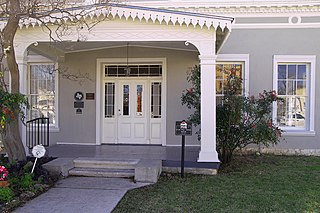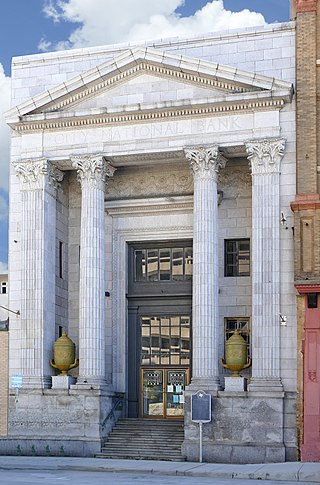
Dealey Plaza is a city park in the West End Historic District of downtown Dallas, Texas. It is sometimes called the "birthplace of Dallas". It was also the location of the assassination of John F. Kennedy in 1963. Thirty minutes after the shooting, Kennedy was pronounced dead at Parkland Memorial Hospital. The Dealey Plaza Historic District was named a National Historic Landmark on the 30th anniversary of the assassination, to preserve Dealey Plaza, street rights-of-way, buildings, and structures by the plaza visible from the assassination site, that have been identified as witness locations or as possible locations for the assassin.

George Bannerman Dealey was a Dallas, Texas, businessman. Dealey was the long-time publisher of The Dallas Morning News and owner of the A. H. Belo Corporation. A plaza in Dallas is named in his honor and became instantly world-famous when it was the site of the assassination of John F. Kennedy in 1963.

The Strand Historic District, also known as the Strand District, in downtown Galveston, Texas (USA), is a National Historic Landmark District of mainly Victorian era buildings that now house restaurants, antique stores, and curio shops. The area is a major tourist attraction for the island city and also plays host to two very popular seasonal festivals. It is widely considered the island's shopping and entertainment center. The district includes properties along the south side of Harborside Drive and both sides of The Strand and Mechanic Street from 20th Street westward to 26th Street.

The Dal-Tex Building is a seven-story office building located at 501 Elm Street in the West End Historic District of downtown Dallas, Texas, United States. The building is located on the northeast corner of Elm and North Houston streets, across the street from the Texas School Book Depository in Dealey Plaza, the scene of the assassination of U.S. President John F. Kennedy on November 22, 1963. The Dal-Tex Building, sometimes called the Dallas-Textiles Building, the Dal-Tex Market Building, or the Dal-Tex Mart Building, was a center of the textile business in Dallas.

Rosenberg Library, a public library located at 2310 Sealy Street in Galveston, Texas, United States, is the oldest continuously operating library in Texas. It serves as headquarters of the Galveston County Library System, and its librarian is also the Galveston County Librarian.

The Bishop's Palace, also known as Gresham's Castle, is an ornate 19,082 square feet (1,772.8 m2) Victorian-style house, located on Broadway and 14th Street in the East End Historic District of Galveston, Texas.

The Old Lyford High School is a historic school building in Lyford, Texas. Built in 1923 as the first high school in Willacy County it was designed by the architectural firm Smith & Kelly. It was added to the National Register of Historic Places and designated a Recorded Texas Historic Landmark in 1985.

First Presbyterian Church of Dallas is a historic congregation at 1835 Young Street in the Farmers Market District of downtown Dallas, Texas (USA). The current building is a contributing property in the Harwood Street Historic District and a Dallas Landmark. The congregation was founded in 1856 as the first U.S. (Southern) Presbyterian Church organized in Dallas, and is the mother church from which many other Presbyterian churches in the area have stemmed.

The Masonic Home and School of Texas was a home for widows and orphans in what is now Fort Worth, Texas from 1889 to 2005. The first superintendent was Dr. Frank Rainey of Austin, Texas. Starting in 1913, it had its own school system, the Masonic Home Independent School District. Orphan Blake R. Van Leer was the only boy in 1909, went on to become president of Georgia Tech and civil rights advocate.

The United States Customs House and Court House, also known as Old Galveston Customhouse, in Galveston, Texas, is a former home of custom house, post office, and court facilities for the United States District Court for the Eastern District of Texas, and later for the United States District Court for the Southern District of Texas. Completed in 1861, the structure is now owned and operated by The Hodge Law Firm.

First Presbyterian Church is a historic church building at 1903 Church Street in Galveston, Texas.

Ashton Villa is a fully restored, historic home located on the corner of 24th and Broadway in Galveston, Texas, United States. Constructed in 1859, it was one of the first brick structures in Texas built by slaves.

The Wahrenberger House is located two blocks from the Texas Capitol, at 208 W. 14th Street, in Austin, Travis County, in the U.S. state of Texas. The home was built between 1867 and 1868 by Friedrich Huster and sold to Charles Klein after completion. The house is named for Klein's daughter Caroline Wahrenberger, who was deeded the house in 1882. Since it was built, the house has served as a residence for several generations of the Klein–Wahrenberger family, and was the location for two German–American schools. At different times, both Pat Morris Neff and Sam Rayburn lived in the residence when Mrs. Wahrenberger ran it as a boarding house. It was added to the National Register of Historic Places listings in Travis County, Texas in 1978, and was designated a Recorded Texas Historic Landmark in 1972.

The Carl W. A. Groos House is located in the city of New Braunfels, county of Comal, in the U.S. state of Texas. It was added to the National Register of Historic Places listings in Comal County, Texas in 2000, and designated a Recorded Texas Historic Landmark in 1968. Groos occupied this house for approximately one year. He moved to San Antonio, and in 1880 had architect Alfred Giles design his home which became known as the Carl Wilhelm August Groos House. Originally owned by one of the early German emigrants to New Braunfels, the house has also remained in the hands of descendants of the early German settlers. Diplomat Bob Krueger used the building for his business office and renovated it in 1999.

The City National Bank (CNB) was a bank, and the name of the historic building in Galveston, Texas, United States and is listed on the National Register of Historic Places NRHP). The bank was founded in December 1907 by William Lewis Moody Jr. (1866–1954) and the building was completed in 1920. City National Bank renamed itself the Moody National Bank in 1953 to honor the founder. The downtown building served as the Galveston County Historical Museum until 2008 when it was badly damaged by Hurricane Ike, after which the museum's assets were moved to the Galveston County Courthouse. Since then the former CNB building has been unused.

Eugene Thomas Heiner was an American architect who designed numerous courthouses, county jails, and other public buildings in Texas. He was born in New York City, apprenticed in Chicago, and studied further in Germany. His works includes buildings listed on the U.S. National Register of Historic Places.

The Menard House, also known as The Oaks, is a historic detached-home located at 1605 Thirty-Third Street in Galveston, Texas. Built in 1838, it is the oldest surviving structure in Galveston as recently as 2014 and is on the National Register of Historic Places.The address for the home is 1604 33rd St, Galveston TX.

The George Washington Grover House is a two-story house located at 1520 Market in the East End Historic District of Galveston, Texas. Built in 1859, the house is one of the oldest brick residences in the city.

Allen Depot was established in 1876 in the central ward of Allen, Texas. The train depot served as a water stop for the Galveston and Red River Railway chartered by Ebenezer Allen in 1848. By 1856, the Southeast Texas to Red River railroad would transition to the Houston and Texas Central Railway.






















